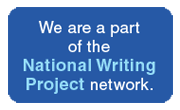About TRWP
The Tar River Writing Project began in 2007 as a collaborative project among the Department of English (Thomas Hariott College of Arts and Sciences), the Department of Curriculum & Instruction (College of Education), and schools and school districts in Eastern North Carolina. A network of teachers and teacher-researchers across all academic disciplines and at all levels of education (pre-K through university), the TRWP fosters an environment in which teaching professionals come together to be better writers and better writing teachers and to raise the levels of literacies in our region of North Carolina.
About the National Writing Project
The National Writing Project is a network of local sites located in universities across 50 states, the District of Columbia, Puerto Rico, and the U.S. Virgin Islands. Each site conducts an annual Summer Institute and sponsors professional development workshops during the school year. Sites also design programs that address local issues and the particular needs of schools, teachers, and students in their communities. The NWP adds new sites each year, with the goal of placing a writing project site within reach of every teacher in America to help all students become successful writers and learners.
How do we know that the Writing Project is making a difference?
Impact on Students
National studies confirm significant gains for students of teachers who have participated in NWP programs.
In research conducted during the 2004-2005 and 2005-2006 school years, studies with comparison groups show statistically significant gains in writing performance for students who are in classrooms led by Writing Project teachers. In every comparison, results favor students in the classes of teachers participating in NWP programs.
Independent national scorings of student writing also show that NWP students’ improvement outpaces that of students in carefully constructed comparison groups. Consistently favorable results are particularly noteworthy for the quality of students’ ideas, organization, voice, and use of conventions in their writing.
Impact on Teachers
Teachers consistently give high marks to the quality of NWP’s professional development Summer Institutes.
Results of an independent evaluation show that more that 97 percent of teachers who participated in NWP’s 2005 Summer Invitational Institutes found value in the program and found institutes useful to their teaching.
An overwhelming majority of teachers report that in the school year following their participation in an NWP Summer Institute, they increased their use of teaching practices that support students’ writing development. These teachers say the Summer Institute made them better teachers of writing.
A majority of NWP teachers report that they now use techniques in their classrooms that have been statistically correlated to higher achievement levels on the National Assessment of Educational Progress.
How did the NWP start?
In 1974, a group of 25 teachers came together with university faculty on the University of California, Berkeley campus for the first invitational institute, where they experienced the invaluable support of colleagues, the opportunity to learn from each other and from research, the time to write, and the anticipation of how positively students would respond to new classroom approaches to writing. The idea of “teachers teaching teachers” was both revolutionary and commonsensical. Immediately, universities and school districts around the country began to ask about the projects, and the idea of a national network was born.
Since 1974, NWP sites have popped up at local colleges and universities around the country, and today, the NWP can claim the largest, most cost-effective, primarily grass-roots organization impacting America’s schools, teachers, and students. For a fraction of what the federal government pays to support comparable programs, the NWP continues to deliver high-quality professional development that builds teacher-leaders in their own schools and communities; these teachers go on to touch the lives of countless students.
NWP Works! Come join our network!










